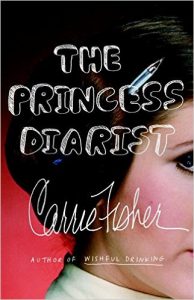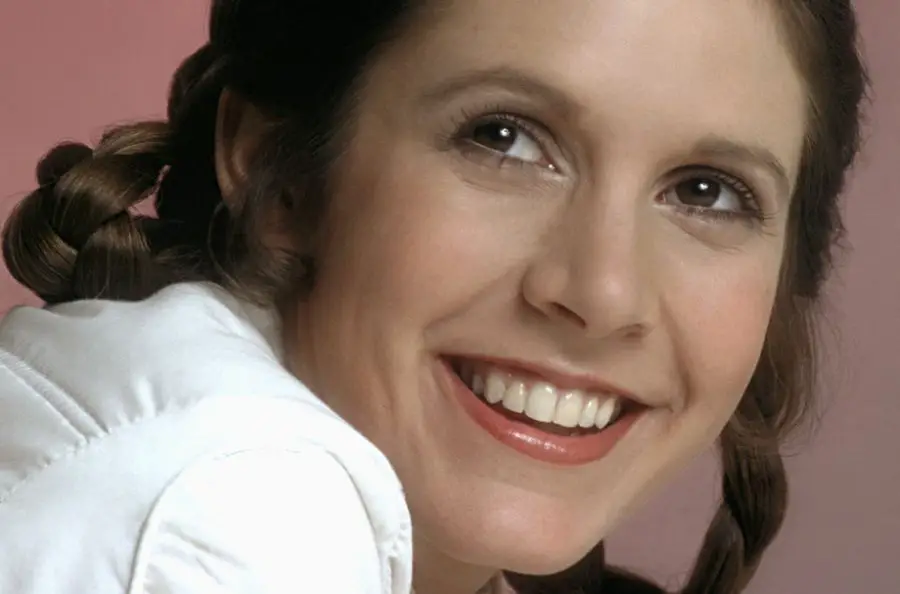 The Princess Diarist
The Princess Diarist
Carrie Fisher
Blue Rider Press
Release Date: November 22, 2016
ISBN 978-0-3991-7359-2
In her 1984 semi-biographical novel Postcards from the Edge, readers were introduced to actor Carrie Fisher’s wry wit, her self-deprecating insight, and her lack of calculated artifice. Over 30 years later, The Princess Diarist bridges Postcards, giving us a younger Carrie’s wide-eyed entrance into her own fame, and an older Carrie’s insight on that time and what has come since. It is not a memoir so much as a musing on a point in her career that had been pretty much put to bed, then resurrected again.
I had two preconceived notions about The Princess Diarist before I read it, mainly based on media hype but also due to my own assumptions. Both of these notions turned out to be wrong.
The first was in presuming how much of the book would be actual journal entries. I had assumed that The Princess Diarist would be filled with a young starlet’s gossipy ramblings, while in reality, less than a third of the text is taken from her journals – and none of it is idle chatter. Instead, these deeply insightful entries are bookended with Ms. Fisher’s narrative on her life up to and through the Star Wars (Episodes IV – IV) era, and her musings on how Star Wars has influenced her life since then.
The second debunked notion was the treatment of her affair with Star Wars co-star Harrison Ford, which I had based on the scandalized reaction of social media to the revelation. “Carrie Fisher Says She ‘Ambushed’ Harrison Ford With Affair Admission in Book” screamed the headline in The Hollywood Reporter, a sentiment that was echoed far and wide. Reality contains far less drama. The truth is Mr. Ford was sent a copy of the manuscript and told he could remove anything he felt uncomfortable with, but never responded to the offer. Yes, Ms. Fisher admitted in an interview with NPR that he was most likely uncomfortable with much of what she had written, and yes, she had stated that “it probably feels like an ambush.” But she also asserted, “… it’s not like it’s negative about him — it’s just a personal story that’s been a secret for a long time.”
Actually, quite a bit of The Princess Diarist is about a young Carrie’s relationship with her older, more worldly, married co-star; she was, after all, only nineteen and starring in her first honest-to-goodness movie – of course she was taken with the situation in which she found herself. But while the narrative leading up to the journal entries sometimes had an “oh, he’s so cute, there’s no way he would notice me!” sentiment, far more compelling was Carrie’s response to a surprisingly unromantic, unsatisfying relationship.
Here was a child of a fairy-tale family that was broken (Carrie’s mother, America’s sweetheart Debbie Reynolds, was unceremoniously dumped by crooner Eddie Fisher for the newly divorced Elizabeth Taylor), a child who grew up witnessing the decay of both her parents’ once mighty, once lucrative careers. Still, this film shoot in London was her first real foray into independent adulthood, and the gregarious young woman was riding high. Everything was new, everything was exciting.
But for all the excitement, for all the promise, she seemed to be constantly waiting for a trap to snap shut. Amazed that the brooding, handsome, movie-star-in-the-making Harrison Ford had decided to hook up with her, she was equally afraid of being inadequate, of being too needy, too boorish, and unable to distance herself from her own ever-churning doubts and fears.
This is what we glimpse in the journal entries. They are raw and emotional, and they resonate. Carrie Fisher’s life seemed so large, so full of promise – she was Princess Leia, for crying out loud! And yet that very point in her life when she should – and was – riding high, she was also struggling with her own internal vulnerabilities, her own keen sense of inadequacy, a surging tide and a quagmire, a wonderment and a weariness, a bright shine and a leaden dross.
Years later, after Star Wars, we learned of Carrie Fisher’s bipolar diagnosis, and we recognize it here. Later we learned of the excesses, the drinking, the drugs, and we see that it gained purchase here. Later we read the wry wit, her self-deprecating insight, and her lack of calculated artifice – and we realize it’s always been a part of who she was.
And I miss her even more, now.
~ Sharon Browning

